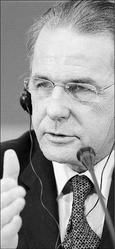
International Olympic Committee President Jacques Rogge speaks at a press conference in Beijing yesterday. Rogge described the situation surrounding the Olympic torch relay a "crisis" for the Olympic movement, but declared that the rest of the international torch relay would not be cut short or cancelled. - AP
BEIJING (AP):
IOC PRESIDENT Jacques Rogge said yesterday the turmoil surrounding the Beijing torch relay and the politically charged build-up to the Summer Games posed a "crisis" for the Olympic movement.
Rogge urged China to respect its "moral engagement" to improve human rights and to fulfil promises of greater media freedom. He reaffirmed the right of free speech for athletes at the Beijing Games.
At the same time, the International Olympic Committee (IOC) expressed relief that the San Francisco leg of the torch relay passed off without major incident, and declared that the rest of the international route would not be cut short or cancelled.
"This scenario is definitely not on the agenda," Rogge said at a news conference. "We are studying together with (Beijing organisers) to improve the torch relay, but there is no scenario of either interrupting or bringing (the torch) back directly to Beijing."
Avoided turmoil
Rogge said the San Francisco relay had "fortunately" avoided much of the turmoil and disruptions that had marred the legs in London and Paris.
"It was, however, not the joyous party that we had wished it to be," he said at the opening of a two-day IOC executive board meeting in Beijing. "Athletes in many countries are in disarray, and we need to reassure them. Our major responsibility is to offer them the games they deserve ... We have 120 days to achieve this."
The San Francisco parade route was changed and shortened to prevent disruptions by massive crowds of anti-China protesters. The planned closing ceremony at the waterfront was cancelled and moved to San Francisco International Airport, where the flame was put directly onto a plane and not displayed.
Still, IOC officials were grateful that there had been no violence.
"I'm very, very happy because there was no injuries," IOC executive board member Gerhard Heiberg of Norway said, "We were afraid of that. That didn't happen, so this was a very good result."
Contentious
The turmoil over the torch relay and the growing international criticism of China's policies on Tibet and Darfur, and overall human rights record have turned the Beijing Games into one of the most contentious in recent history and presented the IOC with one of its toughest tests.
"It is a crisis; there is no doubt about that," Rogge said, "But the IOC has weathered many bigger storms."
He cited the attack on Israeli athletes at the 1972 Munich Olympics and the boycotts of the 1976, 1980 and 1984 Games.
"The history of the Olympic Games is fraught by a lot of challenges," Rogge said, "This is a challenge but you cannot compare to what we had in the past."
Rogge was asked if he had second thoughts about awarding the Games to Beijing seven years ago.
"I've said that it is very easy with hindsight to criticise the decision," he said, "It's easy to say now that this was not a wise and a sound decision."
But Rogge insisted that Beijing had "clearly the best bid" and offered the strong pull of taking the Olympics to a country with one-fifth of the world's population.
"That was the reasoning for awarding the bid to Beijing."
When Beijing was bidding for the Games, Rogge noted, Chinese officials said the Olympics would help advance social change, including human rights. He called it a "moral engagement" and stressed there was no "contractual promise whatsoever" on human rights in the official host city contract.
"I would definitely ask China to respect this moral engagement," Rogge said.
Asked about the comment, a Chinese Foreign Ministry spokeswoman said IOC officials support adhering to the Olympic Charter and "not bringing any irrelevant political factors into the Beijing Olympics".
Chinese police foil 'kidnap' gang

BEIJING (AP):;
CHINESE POLICE uncovered a criminal ring planning to kidnap athletes and others at the Beijing Olympic Games, the Government said, yesterday.
The "violent terrorist gang" was based in the western Xinjiang region and headed by a man identified as Abdulrahman Tuersun, Public Security Ministry spokesman Wu Heping said at a news conference.
Wu said 35 people, including Tuersun and another man, Kuerban Mutalifu, were arrested between March 26 and April 6 for plotting to kidnap athletes, foreign journalists and other visitors to August's Olympics.
Sections of Xinjiang's Muslim Turkic Uighur ethnic group have staged a struggle for a breakaway state.
"They wanted to make a global impact to sabotage the Beijing Olympics," Wu said, adding, "We face a real terrorist threat."
Raise alertness
Wu urged residents to raise their alertness and contact police about suspicious people or incidents.
China has tried to portray the insurgency in Xinjiang as linked to terrorist organisations in central Asia and the Middle East. Evidence has often been scant, though, and some terror experts and overseas law-enforcement officials have questioned whether such ties exist.
Wu said police confiscated almost 10 kilos (22 pounds) of AN-TNT explosive material, eight sticks of dynamite, two detonators, and "jihadist" literature in raids in Urumqi, Xinjiang's capital.
He said the gang hatched the Olympic plot in November and travelled through Xinjiang last month seeking recruits, including those skilled in weapons and explosives.
They also sought fanatics to carry out suicide bomb attacks in Urumqi and other Chinese cities, Wu said. He didn't say whether any volunteers had been found or whether any attacks were imminent, but said police decided to "neutralise the threat" after collecting sufficient evidence.

